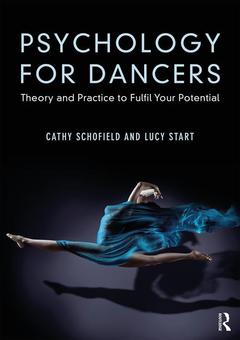Psychology for Dancers Theory and Practice to Fulfil Your Potential
Auteurs : Schofield Cathy, Start Lucy

Psychology for Dancers: Theory and Practice to Fulfil Your Potential examines how psychological theory can be related to dance practice. Aimed at the dancer who wants to maximize their potential but has no grounding in psychology, the book begins with an examination of basic psychological concepts, approaches and methods, before applying theory to dance.
The book explores why dance is so important in many people?s lives: as a form of fitness, a profession, or visual entertainment. Each chapter then examines a different aspect of psychology related to dance in an applied context. Self-perception is examined as dancers are under great scrutiny; a grounded sense of self will ensure a positive perception of self-worth and body image, and suggestions are made as to how a healthy and motivational climate can be created. The book also places an emphasis on how cognitive skills are as important as technical skills, including the ability to learn and recall steps and choreography as efficiently as possible. Social factors are related to the dance context, with a discussion of effective leadership and communication skills and the importance of group cohesion. Finally, there is a review of the impact of emotions on dance practice and how best to manage these emotions.
Each chapter reviews important psychological theories, offering practical suggestions on how they can be applied to dance practice. Psychology for Dancers is an invaluable resource for students, professionals, and teachers of dance.
- Introduction
- Self-perception
- Motivation
- Skill acquisition
- Social factors
- Managing emotions
- Conclusions
Cathy Schofield has been a lecturer in sport and exercise psychology for over 15 years. She has also been dancing for 45 years, including ballet, tap modern/jazz, salsa, street, jive, lindy hop, Zumba and FitSteps. She still appears in local shows as well as enjoying dancing in social contexts, most specifically funk, jazz and northern soul.
Lucy Start is an ex-professional classically-trained dancer who retrained as a dance educator and has been teaching dance for the past twelve years in the private and public sectors. As part of her professional role she has developed courses, choreographed countless productions and lectured at Move It Dance Convention, London.
Date de parution : 08-2018
21x29.7 cm
Date de parution : 08-2018
21x29.7 cm
Thèmes de Psychology for Dancers :
Mots-clés :
Behavioural Self-handicapping; evolution; Paid For Performances; body confidence; Stronger Neural Connections; self-confidence; Pre-performance Routines; self-concept; Preperformance Routines; self-esteem; Mastery Feedback; attribution theory; Emotional Exhaustion; Hierarchical Model; Perfectionist Concerns; Cognitive Evaluation Theory; Perfectionist Striving; Achievement Goal Orientation; Social Physique Anxiety; goal setting; Visuo Spatial Sketchpad; Memory retention techniques; Cognitive Anxiety; choreography; Somatic Anxiety; different emotional states; Instructional Self-talk; stress reduction techniques; Multidimensional Anxiety Theory; Lucy Start; Dual Concern Model; Team Building Interventions; Motivational Self-talk; Performance Errors; Ego Orientation; Motor Programs; Dancer’s Perception; Social Comparison Theory; BACs; Motor Imagery



